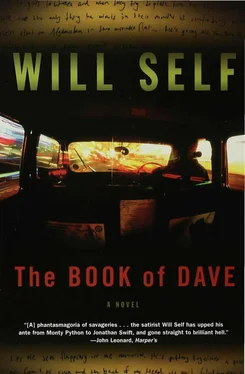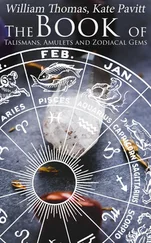— O Dave! Symun suddenly exclaimed. U gonna go on lyke vis awl fiikkin day! He spat his gum out and stood up. Ow mennë tymes av Eye erred all vis bollox abaht Chil — iss gotta B a fouzand aw maw. Eyev erred abaht vair cloff, Eyev erred abaht vair traynors an vair barnets, an vair beefansemis an vair fukkin opares. Wot Eye wanna no iz, wy didunchew ask em abaht fishin aw farmin, or sumffing — anifyng vat myte B an urna eer on Am!
The other dads coughed and stared pointedly at the ground. They waited for Ozmun to administer a drubbing — which he duly did, leaning down from his pile and striking Symun hard with his cudgel. Symun shook more with the effort of repressing his fury than with the pain. He groped for his discarded gum, stuck it back in his cheek, then sat cross-legged, staring out through the blisterweed at the lagoon, with its glaucous tinge of subsurface algae.
— Sorrë, Dad, he said to Ozmun, Eye juss sorta lost í.
— Vass orlrì, Ozmun replied, í appuns.
Then he resumed his account of the voyage the Hamstermen had made to Wyc, to the Bouncy Castle of the Lawyer of Chil — a journey that had taken place over thirty years before, when Ozmun was himself a young dad of twenty-three. This was the last time the Hamstermen had visited Chil as a group. Isolated individuals had been taken away by the Hack, either because of wrongdoing, or because they were opares fancied by one of his party. However, these emigrants never sent back any news of the outside world; for that the Hamsters had to depend on the Chilmen, and they were usually too ill and too overawed by the strangeness of the island to be effective informers.
Over the years that he had been Hack, Mister Greaves himself had been reluctant to remedy the islanders' deficiency. His own view was a conflicted one. To begin with he considered that the business of the island, ensuring its continuing productivity of moto oil and seafowl feathers, would be impaired if the Hamsters understood the commercial value of their products. However, latterly, as the value of these products declined in the rest of Ing, and Mister Greaves found himself having to subsidize his own tenants some years, he inclined to the view that the Hamsters' ignorance was a large part of what made them the happy, healthful, seemingly naturally dävine folk they were.
Furthermore, the Hamsters' hunger for information was difficult to assuage, so utterly ignorant were they of the world beyond their shores. The last King of Ing of whom Ozmun and his contemporaries had heard was David I, who was on the throne at London in the time of their own granddads. Try as he might, Mister Greaves could not convince them that this monarch was long dead, for the meter was not well calibrated within them. As for the last Driver, while he had spent seventeen years among the Hamsters, his vocation had been to awaken them to the world to come, not enlighten them as to their place in this one.
So this decades-old visit to Chil, which had lasted a scant few blobs, remained the most comprehensive picture the Hamstermen had of the lands beyond. In the intervening years, at Council after Council, its tapestry had been picked over and over again, until in some parts it was worn threadbare, while in others it had been fancifully embroidered. Although not much, for the Hamstermen had encountered a peculiar fact about themselves when they tied their pedalo up to the landing stage at Wyc, and, doffing their caps, shuffled into the awesome presence of their Lawd. This was, that while when they left their own island they had spoken in their usual, competitive babble, by the time they came to address the Lawyer of Chil they found that they spoke in complete unison: twelve dads with a single, polyphonic voice. This curious unanimity — born, perhaps, of the intense harmoniousness of their secluded lives — extended to their vivid impressions of this outer world, so that they also recalled it as one, in a sole, unanimous remembering.
Every glancing detail and minute observation culled from the Hamstermen's sojourn on Chil was already seared into Symun and he found it torture to listen yet again, as Ozmun called over this lore in his sing-song voice: the fine stitching of cotton shirts and the scissoring of hair, the curious motion of wheeled vehicles, and the equally peculiar burdening of jeejees and burgakine. Even decades later the amazement that had prevented the Hamstermen from getting to the nub of it all was still evident. For theirs was a word picture of only the surface of these remarkable things: the chaps with their shooters and railings on the Bouncy Castle ramparts, the ocean-going ferries in the harbour, the beefansemis that clustered about it. Symun cherished a desire to read, so he considered it foolish of the granddads not to have attempted to set down their account, so that it might be read in the same manner as the Book. He sighed and, gathering his legs under him, got up. Eyem ahtuví, U Ió, he said to no one in particular.
Symun strolled away from the Council ground, slid between the shitter and the Edduns gaff, then sauntered up the stream through the heart of the manor. Down by the Council wall the dads could hear the mummies singing: We R ve Amster gurls, we ware R air in curls … When Symun appeared they fell silent. It was daddytime, with two days to go until Changeover. The opares were minding the babies and toddlers in the dads' gaffs; the older kids were out with the motos. The bare earth surrounding the walls of the gaffs was beaten and churned by the hurrying feet of the mummies as they worked. Symun stood and, since there were no dads to observe him doing so, watched them intently.
Shell Brudi and Bella Funch sat on the ground grinding flour in the quern set between them. Their legs were outstretched and each bent forward in turn to grasp the wooden rod and pull the heavy top stone for half of its rotation. The air was white with wheatie dust, and sweat stood out on their brows. Shell's sister, Liz, was nursing her newborn baby as she sat in the lea of the Brudi gaff. The infant, a girl, was only a day old and had been anointed with moto oil by Effi that tariff. If she survived the next two blobs without dying of lockjaw, she would then receive both a name and the wheel of Dave.
Effi herself stood at a trestle table braiding the tops of some crybulbs together, so that they could be hung up in the rafters for the kipper. On the table were piles of herbs: jack-by-hedge, comforty, blacktartdog and piss-a-bed. Two other mummies were carding wool, two more were spinning thread. Another posse were changing the thatch on the Bulluk gaff. Three mummies carried bundles of dried pricklebush on their backs and clambered up and down the curved walls, depositing them on the eaves, while one remained aloft so she could lash them down. Nearer to Symun, at another trestle table set up between the Ridmun and Dévúsh gaffs, stood Caff Ridmun, who was dyeing cloth in a tub. Caff, with her withered leg, who leaned heavily so as to favour the sound one. Caff, whom he loved — much as he had once loved his mummy, and still loved Champ, his moto. Caff, who as an opare had been courted, then wed, by Fred Ridmun. Yet, now Caff was knocked up, Fred had no more eyes for her than any daddy did for a mummy. He had paid her childsupport, so he would lie with her again in the mummies' gaff once the baby was weaned — but he would seldom, if ever, speak to her. When she was on the blob Caff would wear a red rag on her cloakyfing — and at that time her old man would not come near her at all.
Symun burned with his desire for Caff — or was it that strange mummyself left inside of him after his final Changeover that wanted not only to lie with her but also to be with her, look at her and talk with her? He could not say; he knew only a desperate motorage as he stared at her slim shoulders and the thick brown plait that trailed from her headdress. If she felt his gaze on her, Caff made no response. She went on pummelling the cloth, gently shoving her full, round tank against the tabletop. Eventually Symun turned and walked away along the shore in the direction of the Shelter.
Читать дальше












